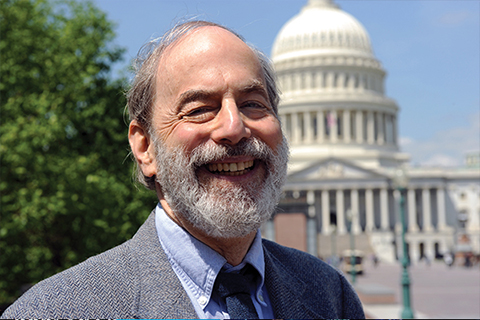Rosenbaum Receives Career Award – But Far From Slowing Down

Stefanie DeLuca (Phd02) was a young graduate student when she first met Northwestern University sociologist James Rosenbaum. After hearing the professor discuss his groundbreaking work on housing and desegregation, she peppered him with follow up questions.
Rosenbaum listened thoughtfully. Then he asked, “Do you want a job?”
“This is what Jim is like,” says DeLuca, who became one of Rosenbaum’s advisees and is now a professor at Johns Hopkins University. “He sees extraordinary research opportunities where no one else does, and then he takes chances on curious but unknown students to help him carry out the vision.”
Rosenbaum’s ability to cultivate talented researchers like DeLuca and his passion for tackling pressing social issues recently earned him the Elizabeth G. Cohen Distinguished Career in Applied Sociology of Education Award from the American Education Research Association. Read his acceptance speech here.
But while Rosenbaum has a lifetime of accomplishments under his belt, he insists he is far from done. Supported by several new research grants, he’s actively building off his past research to help students, families and counselors understand the pros and cons of the “college-for-all” movement. In the classroom, Rosenbaum plans on offering an innovative new undergraduate course called “Global Higher Education.”
“The thing I’m best at is finding good people,” says Rosenbaum, a faculty member in Northwestern’s School of Education and Social Policy and faculty fellow at the Institute for Policy Research. “The only way I could do everything is to delegate. And I’ve had some extraordinary students.”
Like many of those young scholars, Regina Deil-Amen, now a professor of higher education and sociology at the University of Arizona, credits Rosenbaum for shaping her career.
“I would not be the scholar, advisor, and mentor I am today if it had not been for Jim’s support and encouragement, and more importantly, his enthusiasm for my ideas, and how they could translate into research and action,” says Deil-Amen, who nominated Rosenbaum for the award and coauthored their book, After Admission: From College Access to College Success.
A sociologist and professor of human development and social policy, Rosenbaum spent two decades researching what happens when poor inner-city black families from public housing are relocated to the white middle-class suburbs of Chicago.
This quasi-natural experiment, known as the Gautreaux Program, was detailed in Rosenbaum’s 2000 book Crossing Class and Color Lines. His work motivated the federal government to create the groundbreaking Moving to Opportunity (MTO) program, implemented by the U.S. Department of Housing and Urban Development.
Since Rosenbaum first wrote about the program, more than a dozen public housing authorities have created (or are in the process of creating) housing mobility programs, and Congress just funded a $28 million bill to support efforts to help families move to higher opportunity neighborhoods.
College for All?
Rosenbaum’s current research focuses on the burgeoning college-for-all movement, high-school-to-work transitions, and connections between students, schools, and employers. His book, Beyond College for All: Career Paths for the Forgotten Half (2001) describes how quickly the “college for all mindset” spread throughout American society and the wide range of responses by high schools and colleges.
The book offered policymakers a new perspective, supported Equal Employment Opportunity Commission litigation against discriminatory hiring by showing how school-employer linkages were less biased than usual hiring methods and was awarded the American Sociological Association’s Willard Waller Award for Distinguished Scholarship in Sociology of Education in 2003.
“College for all is a wonderful ideal,” Rosenbaum says. “American education has done something gutsy and idealistic, but it’s not always well thought through and doesn’t always work. What do we mean by ‘college?’ What do we mean by ‘all’? Who gets what kind of education? How can we make college work for people who in former decades weren’t qualified for college?”
His eighth and latest book, Bridging the Gaps: College Pathways to Career Success, co-authored by Caitlin Ahearn (BS13) and Janet Rosenbaum addresses some of these questions and shows how institutions can be redesigned to help students succeed.
The book includes examples from Harper College, a community college in suburban Chicago, and City University of New York’s new Guttman Community College, which have implemented reforms based on Rosenbaum’s research.
“Bridging the Gaps goes beyond just identifying the problem of postsecondary inequality to laying out actual organizational responses to remedy the inequality,” says Adam Gamoran, president of the W.T. Grant Foundation, who praised it as a “model of public engagement for scholars in the social sciences.”
Rosenbaum, who loves calling out euphemisms that often mislead students, studied culture and behavior at Yale before earning his doctorate in sociology at Harvard. His passion for sociology stems from his belief that the field provides unique insights into education and helps define fundamental goals of society.
DeLuca, who cut her teeth working on the Gautreaux project with Rosenbaum, said her initial conversation with him changed her life.
“Jim has spent his whole career doing a double shift – conducting serious academic work plus the outreach required for it to make a difference in people’s lives,” she says. “He has creatively and effectively used sociological tools to tackle pressing problems in social inequality in two significant social settings --neighborhoods and schools